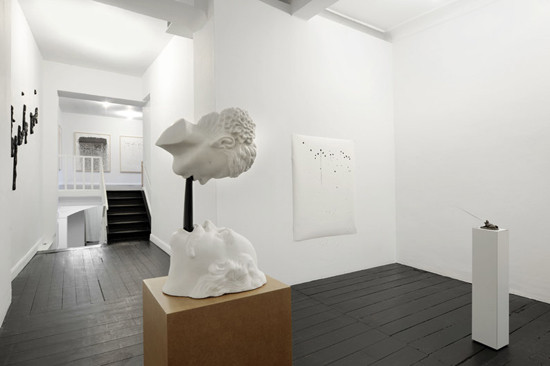Rémy Markowitsch
29 Oct - 17 Dec 2011
Rémy Markowitsch
Emma's Gift
29 October - 17 December 2011
Opening: 29 October, 5 - 9 pm
It's not only Rémy Markowitsch's fascination for the medium of the book and its material qualities that he addresses with his "transilluminations," photographic series that bear titles like "On Travel" (1998–2004), "Tristes Tropiques" (2004), and "We Are Family" (since 2010). In the entire "Flaubert Complex"—beginning with the project "Bibliotherapy meets Bouvard et Pécuchet" (2002) and including the works of the current exhibition "Emma's Gift" inspired by the Flaubert novel "Madame Bovary"—the artist is concerned with the overriding theme of the hallucinatory effect (in the widest sense) of the notorious literary material. And so it happens that Emma Bovary gives a present to her author (in the marble sculpture "Emma's Gift") while the artist presents a gift to his public (in the form of a song by the band The Hillbilly Moon Explosion, "Madame Bovary, c'est moi," a variation on the Flaubert quote).
In the end, what connects the two "gifts" is not least the fact that the marble Emma is actually the sculptural likeness of the singer Emanuela Hutter, who now intonates the piece written by the director of the Centre Flaubert in Rouen, Yvan Leclerc. Flaubert's handwriting, on the other hand, is materialized on a wall in greatly enlarged form as a plastic text image, "liquides noirs"—a passage from "Madame Bovary" that also takes on heightened meaning in the context of the exhibition while an exact replica of Flaubert's toad-shaped inkwell generates an "action painting" à la Rémy Markowitsch resulting in a series of works over the course of the exhibition that accrues at the rate of one piece per day and carries the nonchalant title "Chapeau Crapaud!" in a respectful tip of the hat to the fabulous "author-animal."
Text: Isabel Fluri, translated by Andrea Scrima
Publication:Rémy Markowitsch. liquides noirs
with Essays by Kathrin Becker and Isabel Fluri
Ed. by Markus Hilfiker, Luzern 2011
german/english/french, 64 pages
ISBN 978-3-033-02953-8
Emma's Gift
29 October - 17 December 2011
Opening: 29 October, 5 - 9 pm
It's not only Rémy Markowitsch's fascination for the medium of the book and its material qualities that he addresses with his "transilluminations," photographic series that bear titles like "On Travel" (1998–2004), "Tristes Tropiques" (2004), and "We Are Family" (since 2010). In the entire "Flaubert Complex"—beginning with the project "Bibliotherapy meets Bouvard et Pécuchet" (2002) and including the works of the current exhibition "Emma's Gift" inspired by the Flaubert novel "Madame Bovary"—the artist is concerned with the overriding theme of the hallucinatory effect (in the widest sense) of the notorious literary material. And so it happens that Emma Bovary gives a present to her author (in the marble sculpture "Emma's Gift") while the artist presents a gift to his public (in the form of a song by the band The Hillbilly Moon Explosion, "Madame Bovary, c'est moi," a variation on the Flaubert quote).
In the end, what connects the two "gifts" is not least the fact that the marble Emma is actually the sculptural likeness of the singer Emanuela Hutter, who now intonates the piece written by the director of the Centre Flaubert in Rouen, Yvan Leclerc. Flaubert's handwriting, on the other hand, is materialized on a wall in greatly enlarged form as a plastic text image, "liquides noirs"—a passage from "Madame Bovary" that also takes on heightened meaning in the context of the exhibition while an exact replica of Flaubert's toad-shaped inkwell generates an "action painting" à la Rémy Markowitsch resulting in a series of works over the course of the exhibition that accrues at the rate of one piece per day and carries the nonchalant title "Chapeau Crapaud!" in a respectful tip of the hat to the fabulous "author-animal."
Text: Isabel Fluri, translated by Andrea Scrima
Publication:Rémy Markowitsch. liquides noirs
with Essays by Kathrin Becker and Isabel Fluri
Ed. by Markus Hilfiker, Luzern 2011
german/english/french, 64 pages
ISBN 978-3-033-02953-8

